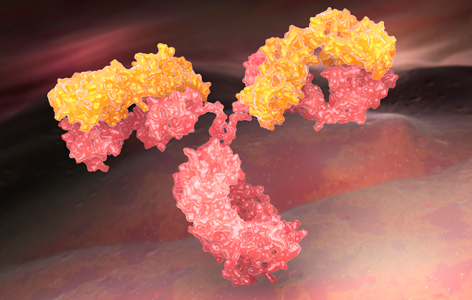Home page Description:
Heart health should be monitored in all women treated with trastuzumab for breast cancer.
Posted On: June 03, 2016

Image Caption:
The drug Trastuzumab (illustrated above) acts by dampening the activity of the HER protein, which promotes the growth and proliferation of breast cancer cells.
Two drugs commonly prescribed to treat early stage breast cancer—anthracyclines and trastuzumab—can weaken the heart. Several clinical studies have revealed that women over the age of 65 treated with these drugs are at increased risk of developing heart failure, a condition that occurs when a weakened heart cannot pump enough blood to meet the body’s needs.
Although the majority of women diagnosed with early stage breast cancer are younger than 65, it remains unclear if these women are also more likely to develop heart failure.
To gain further insight into the effects of anthracyclines and trastuzumab on women’s heart health, PM Cancer Centre Clinical Researcher Dr. Paaladinesh Thavendiranathan and his colleagues examined the medical records of 18,540 women over the age of 18 who had been treated for early stage breast cancer with different combinations of chemotherapy. Almost 80% of the women who participated in the study were under the age of 65.
The researchers found that all women treated with chemotherapy—regardless of their age—were more likely to be experience heart failure within three years of completing their treatment than women without breast cancer. Moreover, they showed that the risk of heart failure was highest among women treated with trastuzumab-based regimens.
Regarding the study, Dr. Thavendiranathan says, “These results suggest that younger patients, who traditionally have been considered at low risk for cardiotoxicity, should also be monitored for breast cancer-related cardiac dysfunction when treated with trastuzumab-based regimens.” He also cautions that the benefits of these cancer-fighting drugs far outweigh their risks, and that—when prescribed—they represent a highly effective treatment for breast cancer.
This work was supported by the Heart and Stroke Foundation of Canada, the Canadian Institutes of Health Research, the Ontario Ministry of Health and Long-term Care and The Princess Margaret Cancer Foundation.
Breast cancer therapy-related cardiac dysfunction in adult women treated in routine clinical practice: a population-based cohort study. Thavendiranathan P, Abdel-Qadir H, Fischer HD, Camacho X, Amir E, Austin PC, Lee DS. Journal of Clinical Oncology. 2016 April 18. [Pubmed abstract]
Although the majority of women diagnosed with early stage breast cancer are younger than 65, it remains unclear if these women are also more likely to develop heart failure.
To gain further insight into the effects of anthracyclines and trastuzumab on women’s heart health, PM Cancer Centre Clinical Researcher Dr. Paaladinesh Thavendiranathan and his colleagues examined the medical records of 18,540 women over the age of 18 who had been treated for early stage breast cancer with different combinations of chemotherapy. Almost 80% of the women who participated in the study were under the age of 65.
The researchers found that all women treated with chemotherapy—regardless of their age—were more likely to be experience heart failure within three years of completing their treatment than women without breast cancer. Moreover, they showed that the risk of heart failure was highest among women treated with trastuzumab-based regimens.
Regarding the study, Dr. Thavendiranathan says, “These results suggest that younger patients, who traditionally have been considered at low risk for cardiotoxicity, should also be monitored for breast cancer-related cardiac dysfunction when treated with trastuzumab-based regimens.” He also cautions that the benefits of these cancer-fighting drugs far outweigh their risks, and that—when prescribed—they represent a highly effective treatment for breast cancer.
This work was supported by the Heart and Stroke Foundation of Canada, the Canadian Institutes of Health Research, the Ontario Ministry of Health and Long-term Care and The Princess Margaret Cancer Foundation.
Breast cancer therapy-related cardiac dysfunction in adult women treated in routine clinical practice: a population-based cohort study. Thavendiranathan P, Abdel-Qadir H, Fischer HD, Camacho X, Amir E, Austin PC, Lee DS. Journal of Clinical Oncology. 2016 April 18. [Pubmed abstract]




